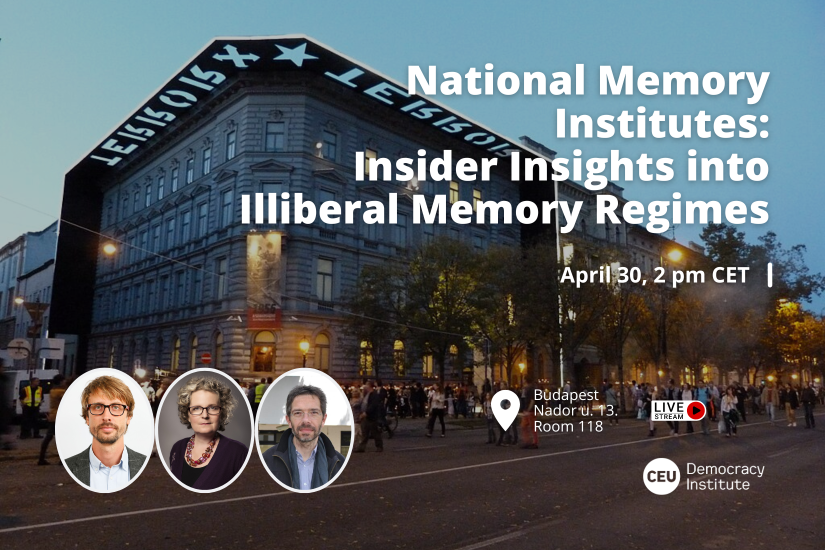
The Democracy in History workgroup of CEU’s Democracy Institute cordially invites you to its seminar.
Registration is required for on-site as well as online participation by April 29 here.
Abstract:
Work on illiberal memory politics has generally neglected the views of insiders, arguably resulting in an unsatisfactory account of some of the deeper social dynamics sustaining memory regimes in post-communist Europe. To bridge this gap, this seminar focuses on insider perspectives of illiberal memory regimes, specifically the voices and accounts of approximately 60 historians and representatives working mostly within Czech and Hungarian National Memory Institutes (NMIs). The seminar attempts to reveal some of the institutional and sociological mechanisms that govern memory-making in both countries and possibly the region at large. In doing so, it conceptualizes illiberal memory regimes less in terms of narrative substance and more in terms of a set of practices governing historiographic expertise – specifically via NMIs. These practices include historiographic co-optation, proneness to legislate history, and an attempt to connect individual and collective memories to more encompassing political identities, all of which are in tension with pluralism and open academic debate. Given their proliferation and their ability to make historical narratives resonant among the population, NMIs should be understood as holding the potential to legitimize illiberalism transnationally.
Speakers:
Zoltán Dujisin is an FNRS Postdoc (National Fund for Scientific Research) based at UCLouvain and was recently appointed Assistant Professor at Corvinus University’s Department of Sociology. He has a PhD in sociology from Columbia University, New York, and was also a Marie Curie Leading Fellow at Erasmus University Rotterdam in the Netherlands. His research interests include sociology of expertise, memory politics and sociology of journalism. His work explores how claims to truth are legitimated through expertise, and the consequences of these processes for identity construction. He has published in Theory & Society, Memory Studies and History & Memory among others.
Muriel Blaive is a socio-political historian of postwar, communist, and post-communist Central Europe, in particular of Czechoslovakia and the Czech Republic. She is currently an Elise Richter Fellow at the University of Graz (2022-2026) in the Department of Sociology. She was an advisor to the director of the Institute for the Study of Totalitarian Regimes (Prague) for research and methodology from 2014-2018 and a historian at the same institute until 2022. Her recent publications include the co-edited volume The Bondian Cold War: The Transnational Legacy of a Cultural Icon, London, Routledge, 2023 (with Martin D. Brown and Ronald J. Granieri), as well as the edition of a special issue on Surveillance of Culture, Culture of Surveillance for East Central Europe, Vol. 49, No. 2-3, October 2022.
Discussant:
Andreas Schedler is a Senior Research Fellow at the CEU Democracy Institute. He is the Lead Researcher of the De- and Re-Democratization Working Group and a Visiting Professor at CEU Vienna. He earned his PhD from the University of Vienna. Before joining the CEU, he was a professor of political science at the Center for Economic Teaching and Research (cide) in Mexico City. A leading comparative scholar of democracy, democratization, and authoritarianism, he has conducted research on democratic consolidation and transition, authoritarian elections, anti-political-establishment parties, political accountability, and organized violence. He is also known for his methodological work on concept analysis and cross-national measurement. His current research focuses on political polarization and the destruction of basic democratic trust.
Background photo: Derzsi Elekes Andor, CC BY-SA 3.0, via Wikimedia Commons